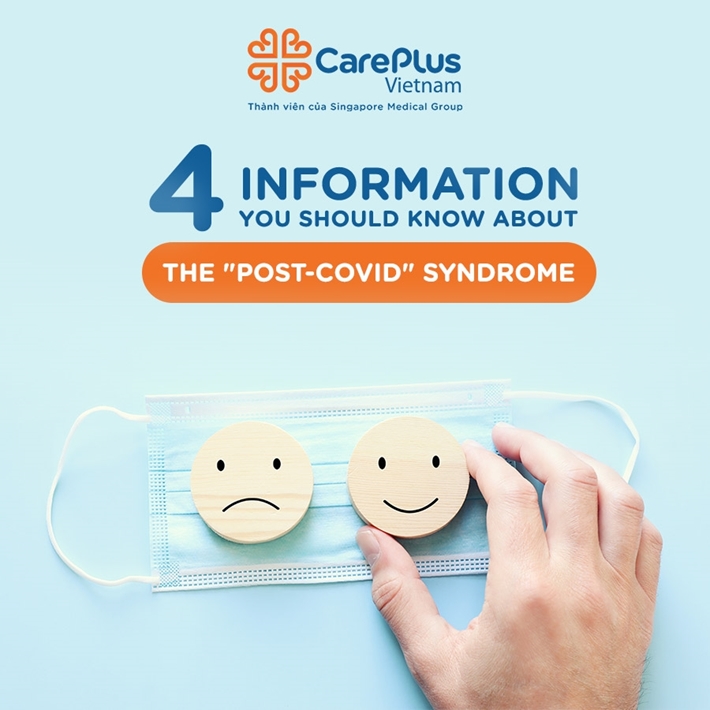4 information you should know about the "Post-Covid" syndrome
A month after his death due to Covid-19, the 70-year-old father, despite having tested negative three times, could go home but still struggling with migraine symptoms, nausea, and dizziness. Especially with difficulty breathing, even though he was previously perfectly healthy. TA took his father to a frontline hospital in Ho Chi Minh City, tested, scanned, and visited multiple organs, costing nearly 10 million. However, the doctors still could not find the cause of the symptoms, and they temporarily placed the older man into the group of persistent post-COVID syndromes.

12/9/2021 12:52:17 PM
1. What is post-Covid syndrome?
Post-COVID syndrome or the world calls “Long Covid”, is no longer a strange disease when the pandemic has lasted for nearly two years, with almost 300 million people infected. This is a condition in which a patient infected with the virus, despite having recovered from acute COVID-19, has symptoms persist for over four weeks from the onset of infection. These symptoms may be present during the acute episode or appear after recovery.
2. Post-Covid symptoms?
A study of the enormous scale ever published in the prestigious medical journal Lancet (UK) revealed that there might be more than 200 COVID sequelae including, prolonged fatigue, headache, musculoskeletal pain, cough, shortness of breath, especially dyspnea with exertion, hair loss, loss of taste and smell, impaired cognitive abilities, such as impaired concentration, confusion, or psychological disturbances, such as anxiety, depression emotions, sleep disturbances.
The above clinical symptoms manifest prolonged COVID but also by subclinical abnormalities, such as laboratory abnormalities: persistent elevation of cardiac enzymes, dysglycemia, thyroid hormone disorders, decreased glomerular filtration rate...; respiratory dysfunction: decreased lung diffusion, limited lung capacity; Imaging abnormalities: pulmonary fibrosis, bronchiectasis on chest CT scan, ventricular dysfunction on echocardiography...
3. How long does this condition last?
May last 3 months, 6 months, even reported up to 9 months. Much research is still being done to monitor patients who develop persistent Covid-19 syndrome.
4. Effectiveness of vaccination for post-Covid syndrome?
Preventing Covid-19 is the best way to avoid the development of post-Covid-19 health problems. Vaccination reduces the risk of serious illness, hospitalization, and mortality, so all eligible people should get vaccinated when it’s their turn. Public health measures such as wearing masks, keeping distance, and washing hands are still essential for post-Covid-19.
A study published in the famous scientific journal The Lancet on September 1 said that being fully vaccinated will reduce the risk of developing lasting Covid-19 symptoms by 50%. The official website of the US CDC also urges people to be fully vaccinated to prevent this syndrome.
How should people who have recovered from Covid-19 take care of their health?
- Patients should exercise gently (slow walking, light exercise, slow cycling, training), limit heavy work, and do light work gradually increasing intensity, helping to relieve stress.
- It is necessary to pay attention to breathing exercises (inhale, exhale slowly, inhale deeply gradually and exhale gently without haste and the pace increases day by day). Besides, it is necessary to be exposed to the sun for at least 30 minutes/day (it can be in the early morning or afternoon sun, divided into 3-4 times, 5-10 minutes each time is moderate), this will help for regulating the body’s circadian rhythms.
- In addition, sick people should not live alone or isolate themselves from everyone in the house. Family members should encourage them to take part in activities with their loved ones, such as preparing meals, cleaning the house. Especially for the elderly, they talk with family members and are loved by loved ones’ encouragement; help will help reduce anxiety and stimulate brain activity after recovering from COVID-19.
- Diet: Patients need to avoid foods that are difficult to digest: high in fat, high in fat, should not eat after 7:00 pm. In addition, it is necessary to limit the use of tea and coffee at night, eat a lot of vegetables, fruits, cool water, and drink enough 1.5-2 litres of water during the day. Change dishes often, prepare food, arrange food attractively, create aroma, change the taste, divide many small meals during the day.
- Even after recovering and being negative, patients should still strictly follow 5K to prevent disease. It is necessary to limit looking at the phone / electronic device screen continuously during the day.
Post-Covid health check
“Children with measles take up to three months to recover. People with typhoid also need months to get well again. Therefore, people with Covid-19 also need time to recover because the body has to mobilize all its energy to create an immune barrier against a completely new virus,” said Dr. In case the symptoms persist for a long time with no signs of improvement, the patient should go to the medical facilities to be consulted by a specialist, do relevant tests to get the treatment.
Therefore, if the symptoms persist for a long time with no signs of improvement, the patient should go to the medical facilities to be consulted by a specialist and do relevant tests to get the treatment.
Contact a CarePlus doctor for advice on unexpected symptoms after Covid infection via our free hotline 18006116 or leave us a message.